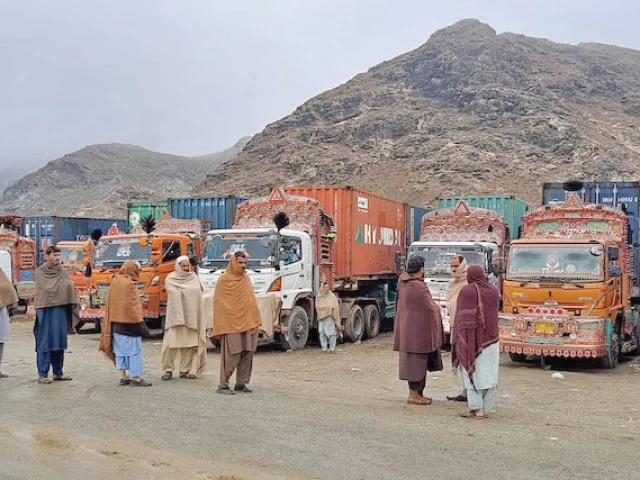Pakistan has not suspended the Afghanistan Transit Trade Agreement, but it was not processing goods clearance due to the closure of borders to avoid congestion at Chaman and Torkham borders, said senior officials of the Pakistan Customs. Photo: Reuters
ISLAMABAD:
The government has foiled an attempt to import Afghan-origin fresh fruits through Iran to circumvent the suspension of bilateral trade, as over 5,500 Afghan transit containers are stranded in Pakistan due to the closure of international borders.
The growing number of Afghanistan-bound cargo stuck in Pakistan despite the closure of international borders after recent skirmishes highlights Kabul’s dependence on Pakistan, even as it seeks alternative trade routes.
Meanwhile, to protect Central Asian Republics from disruptions in international trade via Afghanistan, Pakistan has decided to allow Uzbekistan to airlift five cargoes and reroute 29 containers through China under an international convention signed by all regional countries.
Government sources said Uzbekistan will airlift urgently needed goods while other consignments will be transported through China under the Customs Convention on the International Transport of Goods. Pakistan is completing procedural formalities to facilitate Uzbekistan’s trade.
Afghanistan relies heavily on its neighbouring countries for access to seaports. The border closures have created severe difficulties for Afghan exporters, particularly farmers who rely on earnings from selling goods to Pakistan and other regional markets. Afghanistan’s perishable exports, such as fresh fruits, vegetables, and dry fruits, depend on short-distance, low-cost transport to Pakistani markets. Diversion through other countries makes such exports less competitive due to longer transit times, higher risks of spoilage, and limited cold storage facilities.
To minimise losses, sources said, Afghan exporters have been making desperate attempts at reaching Pakistani markets through alternate routes.
Customs officials said they foiled an attempt to import Afghan-origin goods via Iran by misusing the Early Harvest Programme. On November 8, an importer brought a consignment of fresh fruits weighing approximately 23 metric tonnes to the Taftan customs post and claimed benefits under the programme notified in July this year.
The importer presented an import permit from the Department of Plant Protection and documents confirming Afghan origin – including invoices, bills of lading, export goods declarations, and phytosanitary certificates.
Sources said Customs did not permit entry of the consignment on the grounds that the Early Harvest Programme was designed for mutual benefit on a bilateral and reciprocal basis. As no trade is currently taking place between Pakistan and Afghanistan due to closed borders, the exemption did not apply.
Last fiscal year, Pakistan exported $1.1 billion worth of goods to Afghanistan compared to $600 million in imports.
Customs officials denied entry of Afghan-origin goods due to the risk of misuse of the facility, as similar consignments could be imported from Iran disguised as Afghan produce. Both countries grow comparable fruits such as grapes and apples, covered under the Early Harvest Programme.
Sources said over 5,500 containers bound for Afghanistan are stranded in Pakistan, either on roads or at Karachi port. About 4,650 containers remain stuck at sea and land ports after Pakistan Customs halted processing to prevent congestion at Chaman and Torkham borders.
Pakistan has not suspended the Afghanistan Transit Trade Agreement, but it was not processing the goods clearance due to closure of borders to avoid congestion at Chaman and Torkham borders, said the senior officials of the Pakistan Customs. There are currently 729 containers stranded at Chaman and 142 at Torkham.
Despite the Afghan interim government’s push for alternative trade routes, these options may not be viable due to high costs and long travel distance. Iranian routes are significantly longer and more expensive, resulting in higher transportation and fuel costs compared to the Pakistani corridors. Kandahar and Helmand lie just 150-300 km from Pakistan’s Chaman-Spin Boldak borders but 1,200-1,300 km from Iran’s Zaranj or Delaram borders. Similarly, Balkh and Baghlan are 500-700 km from Pakistan’s Torkham-Jalalabad borders and 900-1,000 km from Iran’s Islam Qala.
Alternate routes through Iran’s Chabahar Port or via Uzbekistan and Turkmenistan would increase transport charges by 30-50%, which may not be economically efficient in the short to medium term. Pakistani transporters are also facing reduced earnings due to the closures. Afghanistan also cannot formally trade through Iran because of United States sanctions.
Sources said that despite tensions, Pakistan remains the most viable and cost-effective trade corridor for Afghanistan.
The impact of suspension of Afghan import of perishable goods has been limited on the inflation basket, and the market has also adjusted to the new realities. According to the Pakistan Bureau of Statistics (PBS), the weekly inflation index decreased 0.6% as of November 6, 2025, after prices of tomatoes reduced 38%, onions 5% and garlic 3.3%.

